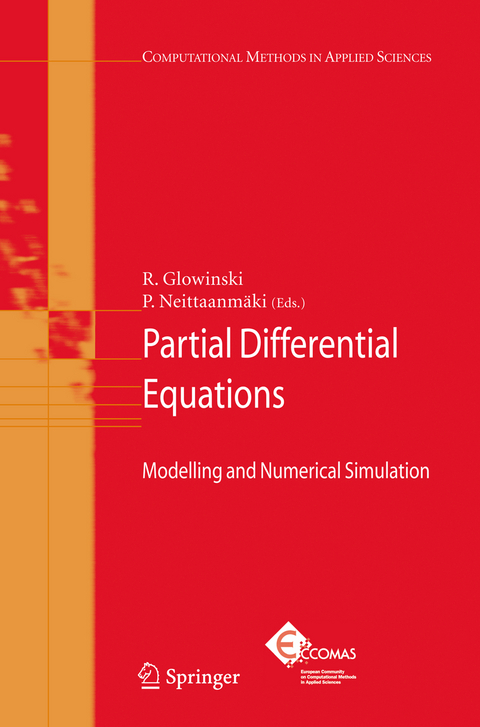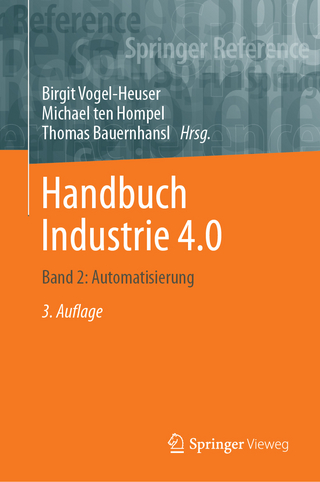
Partial Differential Equations
Springer (Verlag)
978-90-481-7979-4 (ISBN)
For more than 250 years partial di?erential equations have been clearly the most important tool available to mankind in order to understand a large variety of phenomena, natural at ?rst and then those originating from - man activity and technological development. Mechanics, physics and their engineering applications were the ?rst to bene?t from the impact of partial di?erential equations on modeling and design, but a little less than a century ago the Schr¨ odinger equation was the key opening the door to the application of partial di?erential equations to quantum chemistry, for small atomic and molecular systems at ?rst, but then for systems of fast growing complexity. The place of partial di?erential equations in mathematics is a very particular one: initially, the partial di?erential equations modeling natural phenomena were derived by combining calculus with physical reasoning in order to - press conservation laws and principles in partial di?erential equation form, leading to the wave equation, the heat equation, the equations of elasticity, the Euler and Navier–Stokes equations for ?uids, the Maxwell equations of electro-magnetics, etc. It is in order to solve ‘constructively’ the heat equation that Fourier developed the series bearing his name in the early 19th century; Fourier series (and later integrals) have played (and still play) a fundamental roleinbothpureandappliedmathematics,includingmanyareasquiteremote from partial di?erential equations. On the other hand, several areas of mathematics such as di?erential ge- etry have bene?ted from their interactions with partial di?erential equations.
Discontinuous Galerkin and Mixed Finite Element Methods.- Discontinuous Galerkin Methods.- Mixed Finite Element Methods on Polyhedral Meshes for Diffusion Equations.- On the Numerical Solution of the Elliptic Monge—Ampère Equation in Dimension Two: A Least-Squares Approach.- Linear and Nonlinear Hyperbolic Problems.- Higher Order Time Stepping for Second Order Hyperbolic Problems and Optimal CFL Conditions.- Comparison of Two Explicit Time Domain Unstructured Mesh Algorithms for Computational Electromagnetics.- The von Neumann Triple Point Paradox.- Domain Decomposition Methods.- A Lagrange Multiplier Based Domain Decomposition Method for the Solution of a Wave Problem with Discontinuous Coefficients.- Domain Decomposition and Electronic Structure Computations: A Promising Approach.- Free Surface, Moving Boundaries and Spectral Geometry Problems.- Numerical Analysis of a Finite Element/Volume Penalty Method.- A Numerical Method for Fluid Flows with Complex Free Surfaces.- Modelling and Simulating the Adhesion and Detachment of Chondrocytes in Shear Flow.- Computing the Eigenvalues of the Laplace-Beltrami Operator on the Surface of a Torus: A Numerical Approach.- Inverse Problems.- A Fixed Domain Approach in Shape Optimization Problems with Neumann Boundary Conditions.- Reduced-Order Modelling of Dispersion.- Finance (Option Pricing).- Calibration of Lévy Processes with American Options.- An Operator Splitting Method for Pricing American Options.
| Erscheint lt. Verlag | 25.11.2010 |
|---|---|
| Reihe/Serie | Computational Methods in Applied Sciences ; 16 |
| Zusatzinfo | XVI, 292 p. |
| Verlagsort | Dordrecht |
| Sprache | englisch |
| Maße | 155 x 235 mm |
| Themenwelt | Informatik ► Weitere Themen ► CAD-Programme |
| Mathematik / Informatik ► Mathematik ► Algebra | |
| Mathematik / Informatik ► Mathematik ► Analysis | |
| Mathematik / Informatik ► Mathematik ► Angewandte Mathematik | |
| Naturwissenschaften ► Physik / Astronomie ► Allgemeines / Lexika | |
| Naturwissenschaften ► Physik / Astronomie ► Theoretische Physik | |
| ISBN-10 | 90-481-7979-3 / 9048179793 |
| ISBN-13 | 978-90-481-7979-4 / 9789048179794 |
| Zustand | Neuware |
| Informationen gemäß Produktsicherheitsverordnung (GPSR) | |
| Haben Sie eine Frage zum Produkt? |
aus dem Bereich


